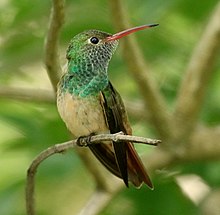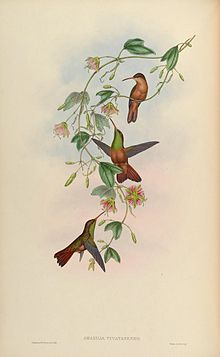Buff-bellied hummingbird
| Buff-bellied hummingbird | |
|---|---|

| |
| Scientific classification | |
| Kingdom: | Animalia |
| Phylum: | Chordata |
| Class: | Aves |
| Order: | Apodiformes |
| Family: | Trochilidae |
| Genus: | Amazilia |
| Species: | A. yucatanensis
|
| Binomial name | |
| Amazilia yucatanensis (Cabot, 1845)
| |

| |
| Range of A. yucatanensis Wintering range Breeding and wintering range
| |



The buff-bellied hummingbird (Amazilia yucatanensis) is a medium-sized hummingbird. It is 10–11 cm (3.9–4.3 in) long and has a mass of 4–5 g (0.14–0.18 oz).
Adults are a metallic olive green above and buffy in the lower breast. The tail and primary wings are rufous in colour and slightly forked. The underwing is white. The bill of the male is straight and very slender. It is red in colouration with a darker tip. The throat is a metallic golden green. The female has a dark upper bill, and is less colourful than the male.
Their breeding habitat is forests and thickets that extend from the lower Rio Grande Valley of southernmost Texas in the United States through the Yucatán Peninsula of eastern Mexico, ending in northern Belize and northwestern Guatemala in Central America. It prefers pine-oak forests, semi-arid scrub and thickets along watercourses. The female builds a nest in a protected location such as a shrub or tree. Both males and females of any age aggressively defend feeding locations within his or her territory. Females lay two white eggs.
This hummingbird is partially migratory. The buff-bellied hummingbird winters in small numbers along the Gulf Coast of the United States from Texas to the Florida panhandle.
These birds feed on nectar from flowers and flowering trees using a long extendable tongue and catch insects on the wing.
References[]
- ^ BirdLife International (2016). "Amazilia yucatanensis". IUCN Red List of Threatened Species. 2016: e.T22687606A93160275. doi:10.2305/IUCN.UK.2016-3.RLTS.T22687606A93160275.en. Retrieved 12 November 2021.
External links[]
| Wikimedia Commons has media related to Amazilia yucatanensis. |
| Wikispecies has information related to Amazilia yucatanensis. |
- BirdLife species factsheet for Amazilia yucatanensis
- "Amazilia yucatanensis". Avibase.

- "Buff-bellied hummingbird media". Internet Bird Collection.
- Buff-bellied hummingbird photo gallery at VIREO (Drexel University)
- Buff-bellied hummingbird species account at Neotropical Birds (Cornell Lab of Ornithology)
- Interactive range map of Amazilia yucatanensis at IUCN Red List maps
- Buff-bellied hummingbird Species Account – Cornell Lab of Ornithology
- Audio recordings of Buff-bellied hummingbird on Xeno-canto.
- Amazilia yucatanensis in Field Guide: Birds of the World on Flickr
- IUCN Red List least concern species
- Amazilia
- Birds of the Rio Grande valleys
- Birds of Mexico
- Birds of the Yucatán Peninsula
- Birds of Belize
- Birds of Guatemala
- Hummingbird species of Central America
- Birds described in 1845
